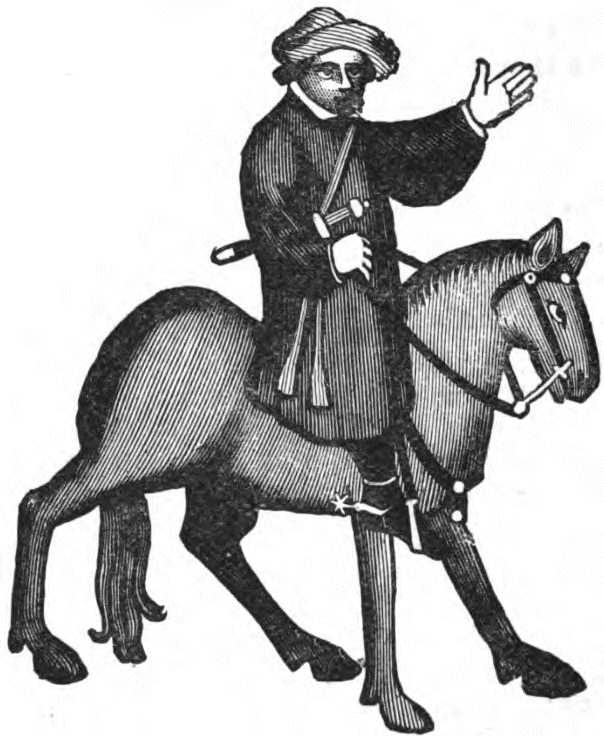

THE SHIPMAN
Chaucer's Shipman was the master of his barge,'the Maudelayne,' since it was he who was responsible for its steering and for the fate of its assailants. A vessel named the 'Magdaleyne' of Dartmouth, Peter Risshenden, master, paid custom duties in 1386, but as Chaucer only says that his Shipman may have come from Dartmouth, we must not rush to the conclusion that it was Peter Risshenden who tossed his prisoners overboard, and stole the wine he was carrying. An excellent paper on the Shipman was contributed to Part V. of the Chaucer Society's Essays by Dr. P. Q. Karkeek. Most of the following notes are drawn from this.
388. by weste, towards the west, in the west country.
389. For aught I woot he was of Dertemouthe. A west-country sailor would be likely to come from either Dartmouth or Fowey, as these in Chaucer's days were the two chief western ports. [For the siege of Calais in 1347 Yarmouth contributed 43 ships and 1905 men; Fowey, 47 ships and 770 men; Dartmouth, 31 ships and 757 men; London, only 25 ships and 602 men.]
390. He rood upon a rouncy as he kouthe. A rouncy was "a heavy powerful animal, either a packhorse or such as is suited for rough agricultural purposes." Dr. Karkeek suggests that the Shipman had paid the usual two shillings horse-hire for the journey from London to Canterbury, and that the dealer had taken advantage of his sailor's ignorance to give him a bad horse. The words 'as he kouthe' suggest that the Shipman knew very little about riding.
393. Aboute his nekke, etc. Sailors in the Royal Navy are said still to carry their knives by means of a cord hung round their necks.
397. Fro Burdeux-ward. It was the custom to go to Bordeaux once a year to fetch wine. [Dr. Karkeek adds: “Froissart describes a fleet of 'Deux cents nefs d'une voile, marchans d'Angleterre et de Galles et d'Ecosse,' who had come together for the sake of the safety which is supposed to lie in numbers. And the numbers seemed to be enormous. In 1350 no less than 1350 vessels laden with 13429 tuns of wine sailed from Bordeaux." The cost of carriage was 10s. per tun, and the 'tunnage' claimed by the king was 3s. 4d.; each sailor in the vintage season received eight shillings wages and the free carriage of a tun of wine in which he could speculate on his own account. The Shipman, therefore, might have used his own wine on the voyage, but preferred to steal that of one of the merchants.] Fro Burdeux-ward=from-wardBordeaux, coming from Bordeaux.
400. By water he sente hem hoom, etc., i.e. he threw his prisoners into the sea. This seems to have been the usual practice of the time. Thus at the battle ol V Espagnols sur mer, off Winchelsea, 1350, when the King boarded a Spanish ship, "the unhappy Spaniards were hurled into the sea," etc. And in the same battle, when the Prince performed the same exploit, all the Spaniards" were cruelly hove overboard" by his triumphant followers. And a little later, in 1403, the Sire du Chatel having seized some English vessels, "threw all their fighting men into the sea," etc. See Hamilton Williams' Britain's Naval Power, 1894, PP- 24, 2S, 35 (a reference I owe to Prof. Hales).
402. hym bisides, that beset him.
408. Fro Gootlond to the Cape of Fynystere, i.e. right along the west coast of Europe from the south of Sweden to the north of Spain. Wisby, the capital of the Isle of Gottland in the Baltic, was one of the chief of the Hanse towns, rivalling Venice in commercial importance, and far exceeding London. It thus formed the furthest goal of ordinary trading voyages to the north.
409. Britaigne, Brittany.
--o--
These notes are reproduced verbatim from Alfred W. Pollard, Chaucer's Canterbury Tales: The Prologue, London: Macmillan, 1903. The book is in the public domain and available for viewing and download from Google Books. Although the book is old, the notes are generally enlightening and accurate. Nevertheless, users doing detailed research on aspects of the General Prologue should, if possible, also consult more recent notes in print publications such as The Riverside Chaucer, ed. Larry D. Benson, 3rd ed., Boston: Houghton Mifflin, 1987.